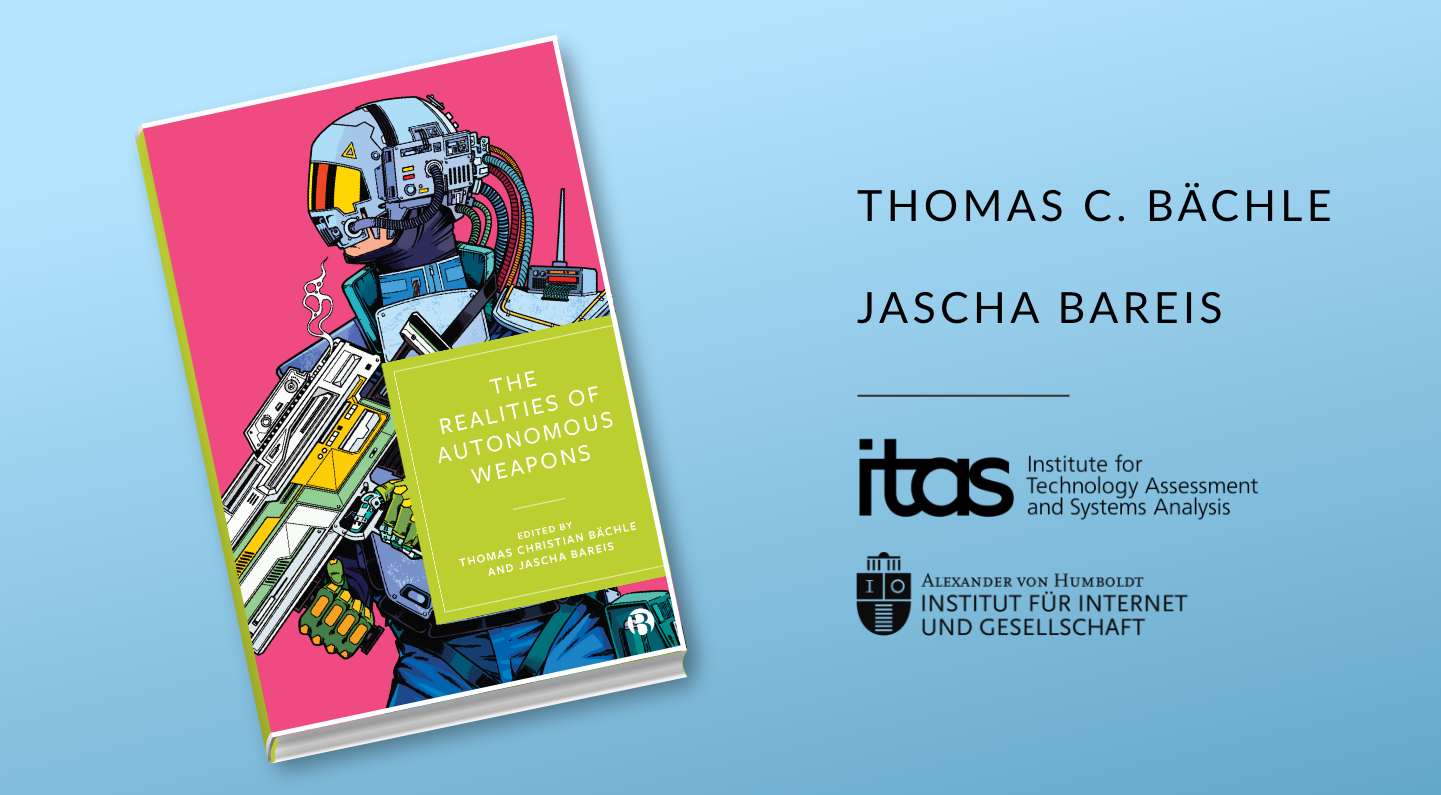
Autonomous Weapon Systems
The development of “autonomous weapons systems” (AWS) has been the subject of controversial debates for years. In many arenas, such as politics, research, law and civil society, the social, geopolitical and ethical implications of this technology are being discussed. Often this is accompanied by calls for strict regulation – including calls for a complete ban.
Despite this, essential questions are still unresolved. On the one hand, it is disputed which systems are to be considered autonomous weapons at all. This often refers to weapons that are ‘only’ automatic or semi-autonomous. On the other hand, it is still unclear how and in which situations human control can be ensured – and how this is to be technically implemented at all.
This indeterminacy is exacerbated by the fact that the debates do not only revolve around existing technologies, or ones that are currently being developed. They also evoke images of future systems that have so far been more of a conceptual vision, for example intelligent and human-like combat robots. The question of which technologies should be regulated and which should not be developed at all opens up a space of discourse that enmeshes existing systems with those that might possibly exist some time in the future.
These dynamics also raise more fundamental questions about the relationship between humans and machines, the degree of autonomy of artificial intelligence and the conditions of human control. These fundamental questions lie at the core of the debates on AI in general. But with the highly consequential technology of autonomous weapons, their relevance and urgency becomes particularly clear.
Research questions
|
| Fact, fiction and imaginationOne of the main theses is that in discussions about autonomous weapons, realities are mixed with imaginations, which both subsequently influence each other. The meanings associated with autonomous weapons are therefore very diverse and range from landmines and combat drones, from human-like robot soldiers to cyber weapons. We look at existing social and technical imaginaries and examine the role they play in the broader public, political and scientific debate. An upcoming book project looks at existing social and technical imaginaries and examine the role they play in the broader public, political and scientific debate. |
|
| Human/machine interaction and human controlThe attribute “autonomous” alone makes these weapon systems appear as technical units that act independently and are no longer subject to any human supervision or control. From a conceptual and theoretical point of view, this requires a classification of the advancing computerisation along broader developments in the field of artificial intelligence. Questions also arise regarding the role assigned to humans in these models (“human in the loop”?) and the conditions of interaction between humans and machines (shaped by interfaces, among other things). |
Project partners
The research on the topic of autonomous weapon systems is conducted jointly with the project Scenarios of interaction – Human-machine interfaces in the discussion on autonomous weapon systems at the University of Bonn, in which the different concepts of human-machine interaction in autonomous weapon systems are analysed. The discussions will be examined by focussing on the specific interface solutions for human-machine interactions in AWS and their socio-technical imaginaries. In this way, the media-related conditions of responsibility as a concept in warfare will be made accessible for critical reflection. The project at the University of Bonn is part of the BMBF-funded joint project Meaningful human control – Autonomous weapons systems in between regulation and reflection (coordinated at the University of Paderborn).
 Jascha Bareis, Dr.Associated researcher: The evolving digital society
Jascha Bareis, Dr.Associated researcher: The evolving digital society Thomas Christian Bächle, Dr.Associate Researcher
Thomas Christian Bächle, Dr.Associate Researcher
-
 Elisa BirkmannStudent Assistant: The evolving digital society: concepts, discourses, materialities
Elisa BirkmannStudent Assistant: The evolving digital society: concepts, discourses, materialities
Journal articles and conference proceedings
Bächle, T. C., & Bareis, J. (2022). “Autonomous weapons” as a geopolitical signifier in a national power play: analysing AI imaginaries in Chinese and US military policies. European Journal of Futures Research, 10(20). DOI: 10.1186/s40309-022-00202-w Publication details
Edited works
Bächle, T. C., & Bareis, J. (Eds.) (2025). The Realities of Autonomous Weapons. Bristol, United Kingdom: Bristol University Press. DOI: https://doi.org/10.51952/9781529237191 Publication details
Other publications
Bareis, J. (2023). We are scared of the question Chat-GPT cannot answer. Because the answer is too obvious. Medium. Publication details
Ernst, C., & Bächle, T. C. (2019). Autonomous weapons – reality or imagination? Digital society blog. Publication details
Bächle, T. C., & Sauer, F. (2019). Autonomous Weapons Systems – Frank Sauer über die Regulation autonomer Waffen, [Audio Podcast] Exploring digital spheres – a podcast by HIIG. Retrieved from: hiig.de/podcast. Publication details
Lectures and presentations
Military AI und Interface-EffekteAutonome Systeme und Interfaces. Ruhr Universität Bochum and Alexander von Humboldt Institut für Internet und Gesellschaft. Humboldt Institut für Internet und Gesellschaft, Berlin, Germany: 05.07.2024 Further information
Thomas C. Bächle, Christoph Ernst
Automation, networks, augmentation – Military technologies and the autonomy of imaginationsImaginations of Autonomy – On Humans, AI-Based Weapon Systems and Responsibility at Machine Speed. Universität Paderborn. Universität Paderborn, Paderborn, Germany: 24.05.2024 Further information
Thomas C. Bächle, Christoph Ernst
The AI-Augmented Super Soldier: Enhancement, Interfaces and the Extended Cognition of Human-MachinesDILEMA Designing International Law and Ethics into Military Artificial Intelligence (Session: Military AI and the Reconfiguration of Human Agency). Organised by T.M.C. Asser Institute. Asser Institute, The Hague, Netherlands: 13.10.2023 Further information
Thomas Christian Bächle
On Technological Seduction: Hermeneutical Deconstruction of Tech Hype5ème Laboratoire Interdisciplinaire Sciences Innovations Sociétés (LISIS 2023). Laboratoire Interdisciplinaire Sciences Innovations Sociétés. University Gustave Eiffel, Paris, France: 05.10.2023 Further information
Jascha Bareis
Die Abhängigkeiten des Super Soldier: Enhancement, Interfaces und die externalisierte Kognition der militärischen MenschmaschinenJahrestagung der Gesellschaft für Medienwissenschaften 2023 (Session: Letale Un/Abhängigkeiten. Bedingungen der Un/Möglichkeiten menschlicher Kontrolle und Verantwortung in autonomen Waffensystemen). Gesellschaft für Medienwissenschaften. Rheinische Friedrich-Wilhelms-Universität Bonn, Bonn, Germany: 28.09.2023 Further information
Thomas Christian Bächle
Human augmentation or augmented machines? Military paradigms and the problem of the unmanned/manned dichotomy in AI-assisted technologiesScience Peace Security '23 (Session: Session 6A: Presentation Session III (Autonomous Systems and Human-Machine Interaction)). Organised by Science and Technology for Peace and Security (PEASEC), TU Darmstadt. Technische Universität Darmstadt, Darmstadt, Germany: 21.09.2023 Further information
Thomas Bächle, Christoph Ernst
"Autonomous weapons” as a geopolitical signifier in a national power play: analysing AI imaginaries in Chinese and US military policiesIAMCR/OCP 23. Communication Policy and Technology Section (CPT) of the International Association for Media and Communication Research (IAMCR). Université Claude Bernard Lyon 1, Lyon, France: 26.06.2023 Further information
Thomas Christian Bächle, Jascha Bareis
Do Politics with Fiction: Circulating Imaginaries of Military AISTS-Hub (Session: Circulating futures: On how to analyze, evaluate and shape the circulations of sociotechnical futures and their impacts for the demands of technology assessment). STS-Hub.de Germany. Human Technology Center, Aachen, Germany: 16.03.2023 Further information
Jascha Bareis
"Autonomy" and "autonomous weapon systems" as a geopolitical signifiers: AI imaginaries in Chinese and US military policiesAutonomy in the Digital Age: Rethinking Relationships between Humans, Technology and Society (Session: Autonomie, Künstliche Intelligenz, Neue Technologien). Universität Bonn, RWTH Aachen. Universität Bonn, Bonn, Germany: 21.11.2022 Further information
Thomas Christian Bächle, Jascha Bareis
"Autonomous Weapons" as a geopolitical signifier: Analysing AI imaginaries in Chinese and US military policiesEASST 2022 (Session: Meaningful human control? Sociotechnical imaginations of AI, drone swarms and the future of warfare). European Association for the Study of Science and Technology. IFEMA North Convention Center, Madrid, Spain: 07.07.2022 Further information
Thomas Christian Bächle, Jascha Bareis
Organisation of events
Intelligent Robotics for Society 5.0 & Industry 4.013.12.2024. Humboldt Institut für Internet und Gesellschaft, Berlin, Germany (International)
Sarah Spitz, Thomas Christian Bächle, Jörg Pohle
Militärische Gewalt und Künstliche IntelligenzFrom 17.04.2024 to 17.04.2024. bpb:medienzentrum Bonn, Bonn, Berlin. Co-Organised by: University of Bonn, Federal Agency for Civic Education (National) Further information
Thomas Christian Bächle
David Betz: Kriegsführung im digitalen Zeitalter29.08.2022. Holzmarktstraße 25, Berlin, Germany (International) Further information
Lena Marie Henkes, Thomas Christian Bächle
Autonome Waffensysteme – Realitäten und Imaginationen zukünftiger Kriegführungwith attending Vip: Jürgen Altmann, Robin Geiß, Frank Sauer, Jutta Weber. 04.07.2019. Humboldt Institute for Internet and Society, Berlin, Germany. Co-Organised by: Christoph Ernst (National)
Thomas Christian Bächle
Thinking about robots04.04.2019. Humboldt Institut für Internet und Gesellschaft, Berlin, Germany (National)
Thomas Christian Bächle



